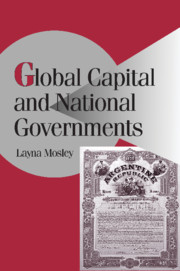Book contents
- Frontmatter
- Contents
- List of Figures and Tables
- Acknowledgments
- 1 NATIONAL GOVERNMENTS AND GLOBAL CAPITAL: A RECASTING
- 2 FINANCIAL MARKET INFLUENCE ON GOVERNMENT POLICY: THEORY AND HYPOTHESES
- 3 FINANCIAL MARKET INFLUENCE IN DEVELOPED NATIONS: AN EMPIRICAL ASSESSMENT
- 4 FINANCIAL MARKET–GOVERNMENT RELATIONS IN EMERGING MARKETS
- 5 POLITICS MEETS MARKETS: DOMESTIC RESPONSES TO FINANCIAL MARKET PRESSURES
- 6 ALTERNATIVE DOMESTIC RESPONSES: CHANGES TO FINANCIAL MARKET–GOVERNMENT RELATIONS
- 7 HISTORY REPEATING ITSELF? FINANCIAL MARKETS AND NATIONAL GOVERNMENT POLICIES BEFORE THE FIRST WORLD WAR
- 8 FINANCIAL MARKET–GOVERNMENT RELATIONS IN THE TWENTY-FIRST CENTURY
- APPENDIX 2.1 FINANCIAL MARKET INTERVIEWS
- APPENDIX 3.1 DATA DEFINITIONS AND SOURCES
- APPENDIX 3.2 FULL RESULTS FOR MACROINDICATORS MODEL
- APPENDIX 4.1 THE COMPONENTS OF THE SDDS
- APPENDIX 4.2 RATING AGENCY METHODOLOGIES
- APPENDIX 4.3 RATING AGENCY OUTCOMES, 1997
- APPENDIX 6.1 NATIONS IN CAPITAL CONTROLS DATA SET
- References
- Index
- Titles in the series
APPENDIX 4.2 - RATING AGENCY METHODOLOGIES
Published online by Cambridge University Press: 14 January 2010
- Frontmatter
- Contents
- List of Figures and Tables
- Acknowledgments
- 1 NATIONAL GOVERNMENTS AND GLOBAL CAPITAL: A RECASTING
- 2 FINANCIAL MARKET INFLUENCE ON GOVERNMENT POLICY: THEORY AND HYPOTHESES
- 3 FINANCIAL MARKET INFLUENCE IN DEVELOPED NATIONS: AN EMPIRICAL ASSESSMENT
- 4 FINANCIAL MARKET–GOVERNMENT RELATIONS IN EMERGING MARKETS
- 5 POLITICS MEETS MARKETS: DOMESTIC RESPONSES TO FINANCIAL MARKET PRESSURES
- 6 ALTERNATIVE DOMESTIC RESPONSES: CHANGES TO FINANCIAL MARKET–GOVERNMENT RELATIONS
- 7 HISTORY REPEATING ITSELF? FINANCIAL MARKETS AND NATIONAL GOVERNMENT POLICIES BEFORE THE FIRST WORLD WAR
- 8 FINANCIAL MARKET–GOVERNMENT RELATIONS IN THE TWENTY-FIRST CENTURY
- APPENDIX 2.1 FINANCIAL MARKET INTERVIEWS
- APPENDIX 3.1 DATA DEFINITIONS AND SOURCES
- APPENDIX 3.2 FULL RESULTS FOR MACROINDICATORS MODEL
- APPENDIX 4.1 THE COMPONENTS OF THE SDDS
- APPENDIX 4.2 RATING AGENCY METHODOLOGIES
- APPENDIX 4.3 RATING AGENCY OUTCOMES, 1997
- APPENDIX 6.1 NATIONS IN CAPITAL CONTROLS DATA SET
- References
- Index
- Titles in the series
Summary
Euromoney
Method: Euromoney surveys economists and political analysts for their views on the creditworthiness of 179 countries. These survey results are combined with quantitative indicators to produce “a sensitive measure of the riskiness of investing in these economies.” Scores range from 0 to 100.
Indicators
Economic data (25%): Based on global economic projections for current and future year performance, as forecasted by 20 economists at leading financial institutions.
Political risk (25%): Risk analysts, risk insurance brokers, and bank credit officers rate countries, with a perfect score for “no risk of nonpayment” and a zero score for “no chance of payment being made.”
Debt indicators (10%): Calculated by using data from the World Bank World Debt Tables for the previous year. Indicators include the ratio of debt service to exports, the current account balance as a percentage of GDP, and the ratio of external debt to GDP.
Debt in default or rescheduled (10%): Based on the amount of debt in default or rescheduled during the last three years.
Credit ratings (10%): The average of sovereign ratings from IBCA, Moody's, and Standard and Poor's.
Access to bank finance (5%): Calculated from disbursements of private, long-term, unguaranteed loans as a percentage of GDP.
Access to short-term finance (5%): Scores calculated by taking coverage available from U.S. Export–Import Bank, NCM UK, ECGD, and membership of OECD consensus groups.
Access to international bond and syndicated loan markets (5%): Euromoney's estimation of how easily a country might access the markets now.
Access to and discount on forfaiting (5%): Reflects the average maximal tenor available and the forfaiting spread over “riskless” countries such as the United States.
- Type
- Chapter
- Information
- Global Capital and National Governments , pp. 330 - 332Publisher: Cambridge University PressPrint publication year: 2003



